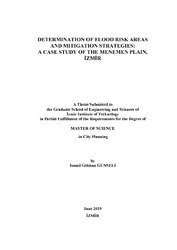Please use this identifier to cite or link to this item:
https://hdl.handle.net/11147/7399| Title: | Determination of Flood Risk Areas and Mitigation Strategies: a Case Study of the Menemen Plain, Izmir | Other Titles: | Taşkın Riski Altındaki Alanların Belirlenmesi ve Önlem Stratejileri: Menemen Ovası, İzmir Örneği | Authors: | Günseli, İsmail Gökhan | Advisors: | Demirkesen, Ali Can | Keywords: | Menemen Plain Flood risk Geographic Information System (GIS) Mitigation strategies Resilience cities |
Publisher: | Izmir Institute of Technology | Source: | Günesli, İ. G. (2019). Determination of flood risk areas and mitigation strategies: A case study of the Menemen Plain, İzmir. Unpublished master's thesis, İzmir Institute of Technology, İzmir, Turkey | Abstract: | According to literature, natural disasters are increasing worldwide. Among them,
flood is the most common and has the most impacts. Because of global warming and
climate-patterns changing, frequency of floods has increased significantly. Also, the
greatest impact among the human-oriented reasons are urbanization and industrialization.
With the spread of urbanization, population in cities around the world has increased
rapidly; natural areas have been destroyed, cities have been expanded. These changes
have increased fragility in cities. Therefore, objective of the study was to determine flood
risk areas and minimize negative impacts of floods. Accordingly, the study area; the
Menemen Plain and its surroundings were found worthwhile to examine due to its
topographic, climatic and hydrological structure. In this study, weighted-overlay analysis
method was used in ArcGIS to determine flood risk areas employing six criteria.
Therefore, six criteria that have an impact on flooding were identified as; (1) slope, (2)
elevation, (3) distance from rivers, (4) distance from junction-points of river, (5) land
use/cover, and (6) rainfall. The weights of criteria were assigned by land and literature
investigation. According to the study, the highest risky flood locations with more
population were seen as Emiralem, Kesik, Buruncuk and Çavuşköy settlements. On the
other hand, medium flood risk settlements with more population were found as Seyrek,
Yahşelli, Sasalı and Yenibağarası. Consequently, resilience and mitigation strategies
were identified. It was stated that flood risk management should be managed in a
participatory manner with a holistic approach and public-private-individual partnership
with structural, non-structural measures. Literatür araştırmasına göre dünya genelinde yaşanan doğal felaketler artış göstermektedir. Sel ise bu felaketler arasında en yaygın ve etkisi en fazla olanıdır. Küresel ısınma ve iklim paternlerinde yaşanan değişimler nedeniyle sel felaketlerinin sıklıklarında ciddi artışlar gözlemlenmiştir. İnsan kaynaklı nedenlerin arasında en büyük etkiye sahip olanlar kentleşme ve sanayileşme süreçleridir. Kentleşme olgusunun yayılmasıyla, dünya genelinde şehirlerdeki nüfus hızla artmış, doğal alanlar tahrip edilmiş ve kentler genişlemiştir. Bu durum kentlerdeki kırılgan alanları arttırmıştır. Bu nedenle, bu çalışmanın amacı taşkın risk alanlarını belirlemek ve taşkınların olumsuz etkilerini en aza indirgemektir. Bu doğrultuda, çalışma alanı olan Menemen Havzası ve çevresi; topografik yapısı, iklim yapısı ve hidrolojik yapısı nedeni ile incelemeye değer bulunmuştur. Taşkın riski altındaki alanların belirlenmesi için ise ArcGIS programında “weighted overlay” analizi kullanılmıştır. Bu doğrultuda sel felaketine etkisi olan altı kriter belirlenmiştir; (1) eğim, (2) yükseklik, (3) nehirlere olan mesafe, (4) nehir birleşme noktalarına olan mesafe, (5) arazi kullanımı/örtüsü ve (6) yağış değerleridir. Belirlenen kriterlerin ağırlıkları arazi incelemesi ve literatür araştırması sonucu atanmıştır. Analiz sonucuna göre; daha fazla nüfusa sahip en yüksek riskli taşkın alanları; Emiralem, Kesik, Buruncuk ve Çavuşköy yerleşmeleri olarak görülmektedir. Ayrıca daha fazla nüfusa sahip orta derecede taşkın riski taşıyan yerler ise; Seyrek, Yahşelli, Sasalı ve Yenibağarası’dır. Bu doğrultuda dayanıklılık ve azaltıcı stratejiler belirlenmiş olup taşkın risk yönetiminin yapısal ve yapısal olmayan önlemlerle, bütüncül bir anlayışla ve kamuözel- birey birlikteliğiyle katılımcı bir şekilde yönetilmesi gerektiğine değinilmiştir. |
Description: | Thesis (Master)--Izmir Institute of Technology, City and Regional Planning, Izmir, 2019 Includes bibliographical references (leaves: 71-77) Text in English; Abstract: Turkish and English |
URI: | https://hdl.handle.net/11147/7399 |
| Appears in Collections: | Master Degree / Yüksek Lisans Tezleri Sürdürülebilir Yeşil Kampüs Koleksiyonu / Sustainable Green Campus Collection |
Files in This Item:
| File | Description | Size | Format | |
|---|---|---|---|---|
| T001976.pdf | MasterThesis | 28.87 MB | Adobe PDF |  View/Open |
CORE Recommender
Page view(s)
408
checked on Jul 7, 2025
Download(s)
526
checked on Jul 7, 2025
Google ScholarTM
Check
Items in GCRIS Repository are protected by copyright, with all rights reserved, unless otherwise indicated.